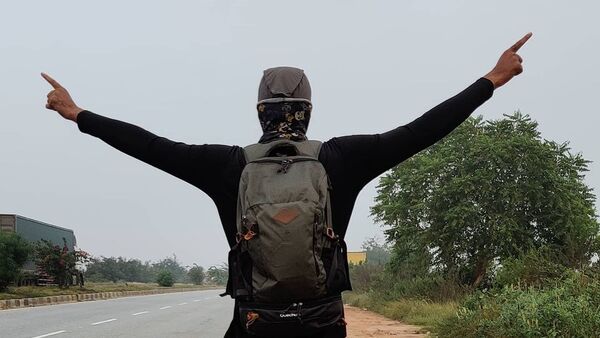Perhaps slowly, but times certainly seem to be finally changing in India. While a major chunk of the boomer generation is still not comfortable addressing the subject of mental illnesses, millennials are getting vocal about the everyday issues that give them restless days and anxious nights.
Meet Ronit Ranjan – a 23-year-old Indian man born in the city of Ranchi in the state of Jharkhand, who has embarked upon an adventurous journey on foot – just so that educational institutions in India include mental health awareness in their curriculum.
View this post on Instagram
On 16 November 2020, Ranjan started his solo walkathon from the extreme southern tip of India, Kanyakumari in the state of Tamil Nadu. To know more about his thrilling undertaking, Sputnik got in touch with Ranjan, who has already successfully covered 1,250 kilometres (by the time Sputnik talked to him) and has reached the city of Hyderabad in Andhra Pradesh.
"On this journey of 4,000 kms, I will be meeting various government officials, making pit stops at schools, local government bodies, private institutions, and social activists, getting petition signatures, spreading awareness and working towards this cause with all the zest and fervour I have in me. I've started a petition asking the Ministry of Education to incorporate mandatory mental health curriculum in Indian schools for high school students", the mental health advocate tells Sputnik.
Growing up, Ranjan says he "never heard terms like depression, anxiety, and mental health", but just about the occasional "suicides" reported in the news.
"I always thought that something must be really wrong with youngsters who choose to take their lives, until I faced a similar situation in 2017, when I decided to take mine due to a spine injury that ended my career in the Armed Forces", Ranjan says, while revealing that he had been training as an army cadet at the National Defence Academy between 2015 and 2017 before the accident happened.
View this post on Instagram
After battling severe depression and anxiety himself, the army-aspirant decided to help the nation in another way by pushing the taboo tag away from mental health issues – in his own way.
"The non-graded mental health curriculum that I am walking for is not about adding more syllabus for the students, but rather educating and sensitising the students through dialogue, discussions, activities, feedback, exercises, skill training, etc. It's high time that the trend of 'observing' a 'mental health week/day' in schools once a year changes to all-year round curriculum. I aim to see a day when any and every Indian teenager can openly talk about their issues, seek support from their parents and peers without being judged, build their 'mental muscle' and enhance not only their well-being but that of the entire Indian society", Ranjan, who wittily calls himself "Mustang" (like the car) on Instagram, says.
Ranjan has divided his journey into two phases – the first of which includes him walking from Kanyakumari to the Indian capital Delhi – stretching about a distance of 3,000 kilometres that he hopes to complete on 31 March 2021.
For the second and final phase of his journey, the young man will walk another 1,000 kilometres from Delhi to Leh where he is expected to arrive by 31 May 2021.
View this post on Instagram
"Upon reaching Delhi, I'll approach Ramesh Pokhriyal, the Education Minister of India, and present my petition. For the petition to look powerful, I need 100,000 signatures. As of now, I have managed to get 18,641 signatures. So far, I have also visited over 20 schools in southern India and have met over ten important government officials as well", Ranjan adds.
An avid Instagram user, Ranjan keeps his 6,000 followers updated with anecdotes from his journey. Sometimes he is panting in his videos, sometimes he is shivering in the cold – but the love and support he has been getting on social media, he says, plays a vital role in keeping his spirits lifted on tough days.
View this post on Instagram
The World Health Organisation (WHO) has estimated that while around 38 million Indians suffer from anxiety issues, over 56 million are burdened with depression. The sad part is that despite these glaring numbers, which according to the WHO will rise by at least 20 percent in the near future, discussions around mental health awareness and seeking therapy are widely stigmatised in Indian society.
A recent report compiled by a group of researchers noted that suicide cases have increased in India because people are stressed over jobs and financial woes. Over 300 Indians ended their lives in distress between March and May alone.
Indian psychologists suggest that just as people go for full body check-ups every three to six months, it would be amazing if they'd approach therapists every once in a while to free their minds.



